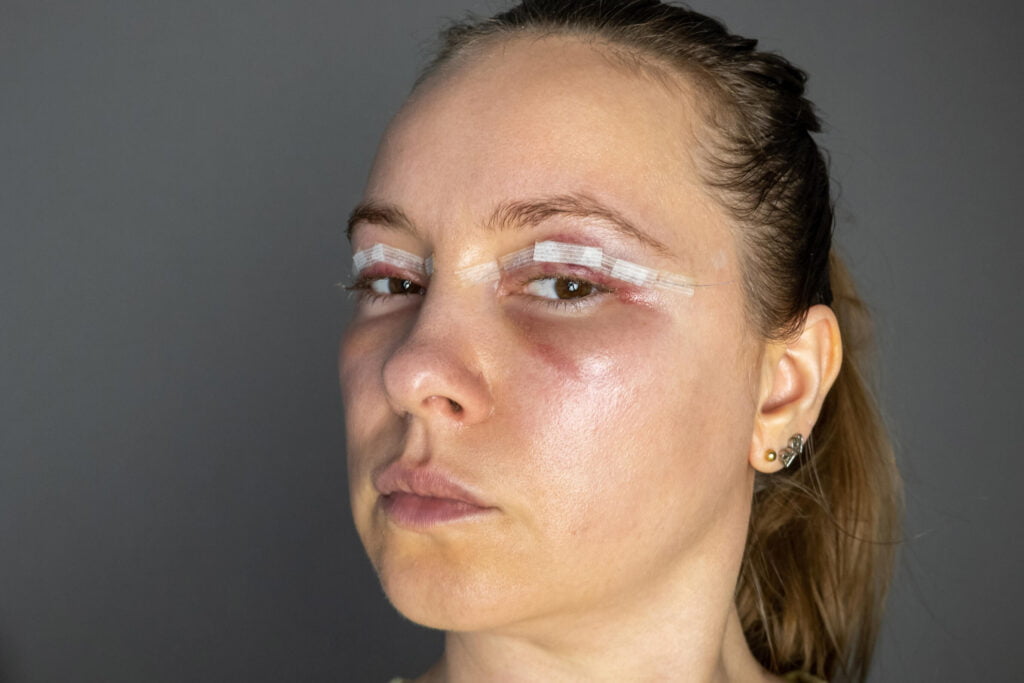Managing Excessive Swelling After Facelift Surgery: Causes and Solutions
Facelift surgery is a transformative procedure designed to rejuvenate your appearance by tightening your skin and underlying tissues. However, swelling is an inevitable part of recovery and often causes patient concern. This comprehensive guide will explore the causes of excessive swelling and, more importantly, the most effective solutions to manage it.
At Dr. George Brennan Cosmetic Surgeon & Medical Spa, we believe in educating our patients for a smooth and seamless recovery. Let’s dive in.
What Causes Swelling After Facelift Surgery?
Swelling after any surgical procedure is a normal bodily reaction. It occurs when the body sends blood vessels, fluids, and toxins to the affected areas, which helps in healing. Due to the nature of the surgery, swelling is a common outcome for a facelift patient. Water retention in the tissues and the incisions made during the procedure can contribute to inflammation.
However, there are several reasons why swelling after facelift surgery may become more pronounced. People often have questions regarding the extent of swelling and the potential side effects. Engaging in post-surgical activities too soon, such as exercise, can worsen the swelling. Additionally, factors like scarring, bleeding, and changes in heat around the treatment site can influence the level of inflammation experienced.
Other contributors include:
- Health conditions.
- The body’s natural way of responding to surgery.
- The type of plastic surgery performed.
Each person reacts differently to surgery, so detailed information on minimizing risks is essential. While the benefits of facelift surgery are significant, managing swelling is critical to achieving optimal results.
The use of recliner chairs to keep the head elevated, proper nutrition through balanced foods, and avoiding stress on the mouth area can all help reduce the severity of swelling. These measures support the body’s work in healing itself, and by following your doctor’s advice on dressings and scarring care, you’ll help reduce the overall risks. Monitoring swelling and how the site reacts to treatment is essential. Always consult with your surgeon regarding any unusual symptoms or concerns.
Everyone undergoing surgery should be aware of the ways their body heals and how to manage the discomfort associated with swelling. Being well-prepared and informed will help minimize post-operative complications.
- Blood Flow and Fluid Retention – One of the primary reasons for swelling is disrupted blood flow in the face post-surgery. When the body detects an injury, it increases fluid in the area to aid healing, but excessive fluid accumulation can lead to discomfort and prolonged swelling.
- Inflammation Due to Tissue Manipulation –During facelift procedures, your surgeon manipulates the tissue and underlying skin layers to achieve the desired results. This naturally triggers inflammation as your body attempts to heal from the process.
- Bruising – Bruising often accompanies swelling because blood vessels can break during surgery. Blood leaks into the surrounding tissues, leading to a combination of swelling and visible bruises.
- Infections – Although rare, infections can occur in some cases and lead to significant swelling. Signs of infection include extreme swelling, redness, pain, and discharge. If you suspect an infection, consult your surgeon immediately.
Common Areas Prone to Swelling
Some areas of the face tend to swell more than others post-surgery.
1. Neck and Jawline
Gravity highly affects the neck and jawline, causing more fluid retention in these areas. Patients often experience tightness and swelling here due to the accumulation of fluids during the healing process.
2. Cheeks and Eyelids
The cheeks and eyelids are sensitive areas of the face. Since facelift procedures commonly target these areas, swelling is prominent in the first few days post-op.
3. Forehead and Temples
Swelling can also occur in the forehead and temples when the facelift involves a brow lift or manipulation of the upper face. Although this is less common, it’s still a possibility.
How Long Does Swelling Last?
Swelling typically peaks 48 to 72 hours post-surgery and then begins to subside. While mild swelling can persist for several weeks, significant swelling usually resolves within two to three weeks. Utilizing ice during this period can help minimize the swelling, and incorporating elevation by raising your head can prevent fluid buildup.
The healing process is gradual, and every patient’s body is unique. Sometimes, minor swelling can last up to six months as your tissues settle into their final position. Ensuring proper rest, using bandages as directed, and allowing stitches to heal while avoiding undue pressure will support faster recovery. Additionally, following your doctor’s instructions regarding care after anesthesia will help to accelerate the recovery process further.

Practical Solutions to Manage Swelling
While swelling is inevitable, numerous strategies can be used to manage it effectively. Below are some tips experts at Dr. George Brennan’s Cosmetic Surgery Center recommended.
1. Use Cold Compresses
One of the simplest yet most effective remedies for managing post-facelift swelling is the application of cold compresses. Cold helps to constrict the blood vessels, reducing both swelling and pain. Be sure to apply the compress gently for 10–15 minutes every hour in the first 48 hours post-surgery.
2. Elevate Your Head
Gravity plays a crucial role in controlling fluid retention. Elevating your head using an adjustable bed or multiple pillows helps prevent fluid from accumulating in your face, thus reducing swelling. Avoid lying flat on your back during the recovery period.
3. Stay Hydrated
Drinking plenty of fluids is key to flushing out toxins and minimizing swelling. Hydration ensures that your body has the resources it needs to heal efficiently. It’s a simple yet highly effective strategy.
4. Avoid Excessive Sodium Intake
Too much sodium can exacerbate fluid retention and increase swelling. During your recovery period, stick to a diet low in sodium. Instead, consume vegetables, fruits, and lean proteins to support your body’s natural healing process.
5. Wear Compression Garments
Surgeons often recommend compression garments to help reduce swelling by applying gentle pressure to the affected areas. These garments promote blood flow and prevent the accumulation of excess fluid. Always follow your surgeon’s instructions regarding the use of these garments.
6. Gentle Massage and Movement
Gentle massage can help reduce swelling by improving circulation. However, it’s essential to avoid aggressive movements and only follow massage techniques that your surgeon has approved. Early movement of your body, such as walking, also helps maintain blood flow, reducing the chance of swelling.
7. Avoid Sun Exposure
Sunlight can cause increased sensitivity and prolonged swelling after surgery. Use sunscreen with a high SPF and avoid direct sun exposure during the healing process. Consider wearing a wide-brimmed hat and protective clothing when outdoors.
The Role of Medication and Natural Remedies
For many patients, medications can be a game-changer in managing excessive swelling. However, some prefer natural remedies. Let’s look at both options.
Prescription Medication for Swelling
Anti-inflammatory medications such as ibuprofen are often prescribed to reduce swelling and inflammation. To avoid complications, follow your doctor’s instructions carefully when taking these medications.
While controlling swelling is essential, addressing pain is equally crucial. Pain medication can help alleviate discomfort, but ensure you are taking medication specifically tailored to your needs and prescribed by your surgeon.
3. Antibiotics
In cases where infection is a concern, antibiotics may be prescribed to prevent post-operative complications. If an infection is suspected or diagnosed, it’s vital to complete the entire course.
Natural Remedies for Swelling
Many patients opt for Arnica, a natural herb known for its anti-inflammatory properties. When applied topically or as a supplement, Arnica can help reduce bruising and swelling.
Bromelain is another natural anti-inflammatory found in pineapple that some patients use to reduce swelling. However, consult with your surgeon before taking any supplements.
When to Consult Your Surgeon About Swelling
While some swelling is normal, excessive or prolonged swelling may cause concern. You should consult your surgeon if you experience any of the following:
- Unrelenting Pain or Discomfort – While some discomfort is expected, persistent pain or worsening swelling should prompt an immediate visit to your surgeon.
- Signs of Infection – Symptoms such as redness, warmth, or discharge could be signs of infection and require prompt attention.
- Swelling Beyond the Expected Timeline – If your swelling persists beyond the usual recovery timeline, scheduling a consultation for further evaluation is essential.
Conclusion for managing swelling
Managing swelling after facelift surgery is a critical component of the recovery process. While it can be uncomfortable, there are many strategies to minimize swelling and ensure a smooth recovery. Always follow your surgeon’s instructions carefully, and don’t hesitate to reach out if you have any concerns.
For more personalized advice on your facelift recovery, book a consultation with Dr. George Brennan, a highly experienced cosmetic surgeon specializing in facelift surgery. Our team is dedicated to providing top-tier care to help you achieve optimal results.
Frequently Asked Question
Does age affect the amount of swelling experienced after a facelift?
Age can influence healing and recovery time. Older patients may experience slower healing and prolonged swelling compared to younger individuals. However, this varies based on individual health and the extent of the facelift procedure.
Can drinking water help reduce swelling after a facelift?
Yes, staying hydrated is important during recovery. It helps flush out excess fluids and promotes healthy circulation. Drinking plenty of water can also prevent dehydration, which may contribute to increased swelling.
Can underlying health conditions lead to excessive swelling after facelift surgery?
Yes, certain health conditions, such as high blood pressure, diabetes, or circulatory issues, can increase the risk of excessive swelling after facelift surgery. Discussing any underlying medical conditions with your surgeon before the procedure is essential to minimize risks.
How does the body naturally manage swelling after surgery?
Swelling after surgery is part of the body’s natural healing process. Fluid and immune cells accumulate at the surgical site to promote tissue repair. Over time, the body reabsorbs this fluid, and the swelling gradually subsides as the healing progresses.
How long should I wait before contacting my surgeon about swelling?
If you notice significant swelling that does not start to improve after the first 1 to 2 weeks, or if swelling suddenly worsens after an initial reduction, you should contact your surgeon. Any signs of infection or abnormal symptoms should also prompt immediate contact.
Can medications cause or contribute to excessive swelling after facelift surgery?
Certain medications, such as blood thinners, anti-inflammatory drugs (e.g., ibuprofen), and certain supplements (e.g., fish oil, vitamin E), can increase the risk of swelling and bruising after surgery. It is essential to inform your surgeon about all medications and supplements you are taking so they can advise you on which ones to avoid before and after surgery.
How can I tell the difference between ordinary and excessive swelling?
Average swelling peaks within the first week or two and gradually improves. Excessive swelling, on the other hand, may worsen after the initial recovery period, be accompanied by pain, or last much longer than expected. If you are unsure whether your swelling is normal, it’s best to consult your surgeon.
Can excessive swelling be prevented?
While it is impossible to prevent all swelling, you can reduce the likelihood of excessive swelling by following your surgeon’s post-operative instructions carefully, avoiding strenuous activity, keeping your head elevated, and attending all follow-up appointments to ensure proper healing.
Can excessive swelling affect the results of my facelift?
Excessive swelling can temporarily distort the appearance of your facelift, making it difficult to see the final results. However, once the swelling subsides, the actual outcome of the procedure will become apparent. In rare cases, prolonged or untreated swelling could lead to complications that affect healing and scarring, potentially impacting the results.
Is excessive swelling dangerous after facelift surgery?
While swelling is not usually dangerous, excessive or prolonged swelling could indicate complications such as infection, hematoma, or fluid retention (seroma). If swelling is accompanied by severe pain, fever, or other unusual symptoms, it’s essential to contact your surgeon promptly.

